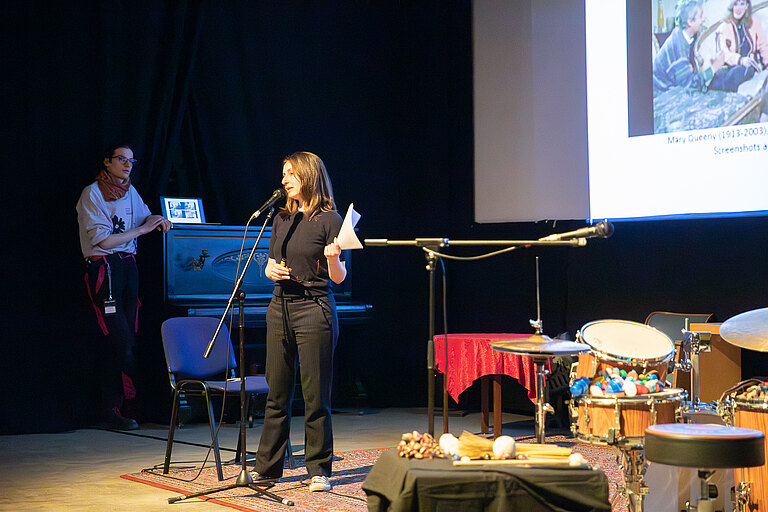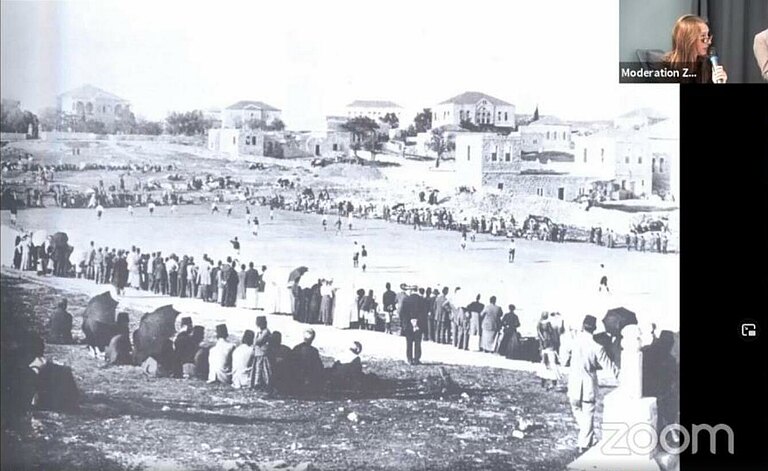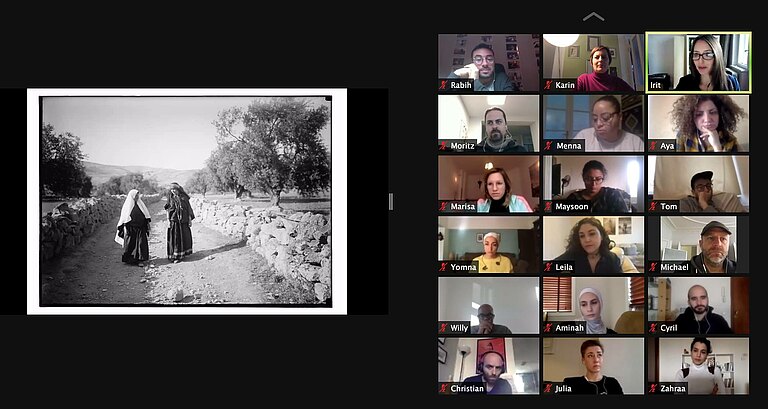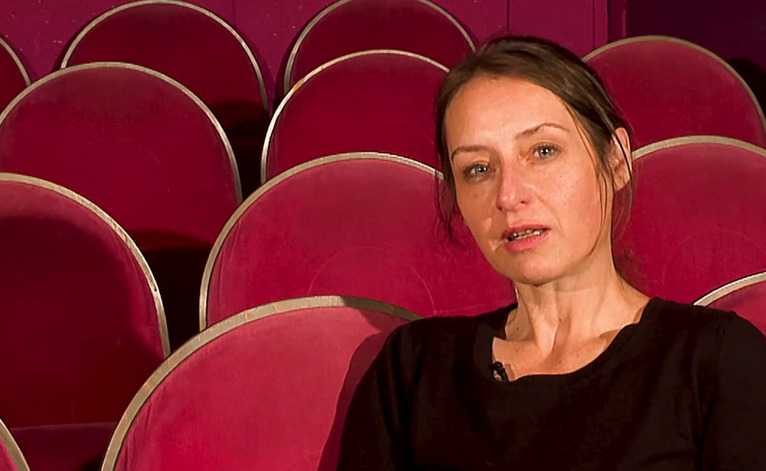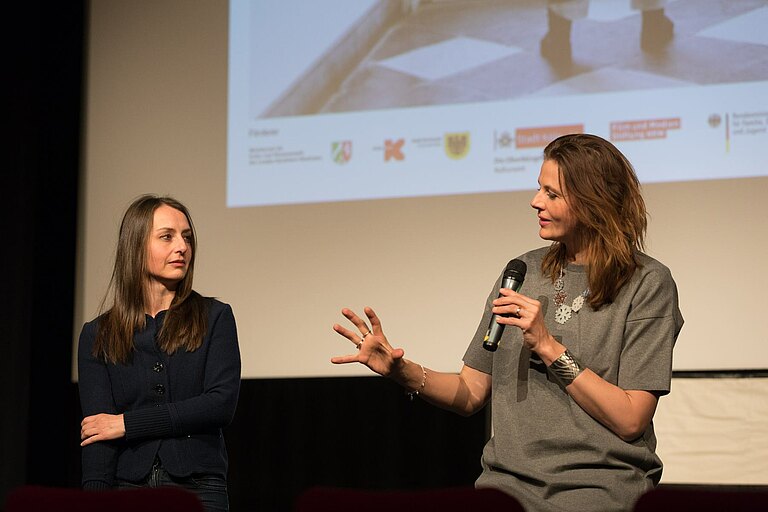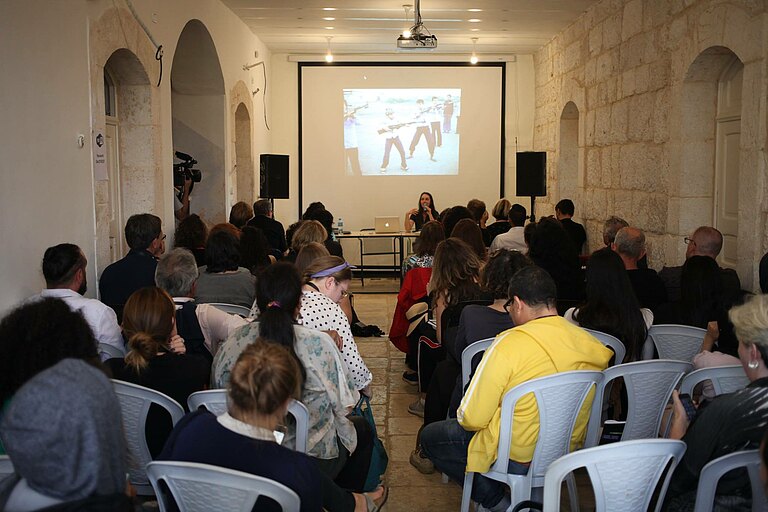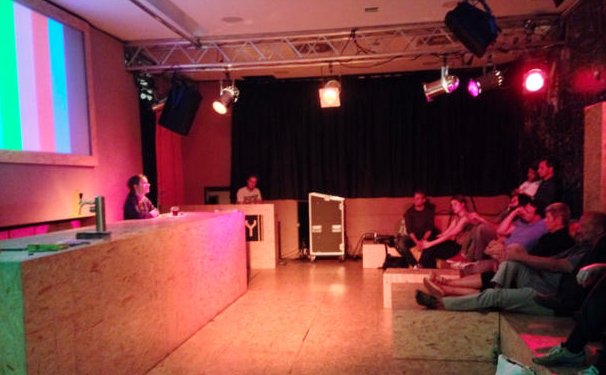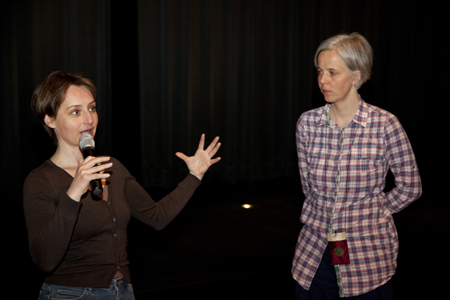Talks
Some say that film was an universal language and that it brought foreign worlds closer to the audience. That film was propaganda and that world cinema blurred the perception about those societies lacking the means for an own image policy is also a widespread view. Thus, can films speak for themselves as yet others claim?
In film talks I briefly introduce the film and am available for in depth discussion after the screening. I give lectures in single events as well as in the framework of conferences. Form and length of the talk depend on the kind of the event.
Talks in Arab countries or for Arab film professionals usually focus on questions of funding, co-production and distribution.
The examples below focus on events that have online references in English, the German page is more exhaustive.
Pioneers, Divas, Visionaries – The Women of Arab Cinema
at Meno Avilys / Lituania, 2022 and at the International Women's Film Festival Dortmund/Germany, 2023
Tunis, 21 December 1922. One hundred years ago, the first film with an entirely Arab and African cast and crew premiered on the North African coast. The script for the 35-minute silent movie Zohra was written by the just 16-year-old Haydée Samama Chikly, who also played the lead role and edited the film. It was produced, directed and shot by her father Albert Samama Chikly. In 1924, daughter and father worked together again to produce a longer film, followed by the first long feature film in Egypt Laila in 1927, paving the way for »Hollywood on the Nile«. The film was produced by 26-year-old Aziza Amir, who also portrayed the eponymous heroine. Since then, women have played a key role in Arab cinema. They have produced films, adopted the star system, taken their cameras to the battle zones of too many wars, set up cinema theatres and festivals, told history and presented their visions for the future. This richly illustrated lecture offers an overview of Arab film history, told through their women.
The Orientalization of the Holy Land, or How has the View of Western Christian Travelers Helped to Shape Today's Image of Palestine in Europe?
In the framework of the [zait wa: zaʕtar] festival, Berlin 2021
Christian Travelers contribute to shaping today’s image of Palestine in Europe? (in German)
Christian European men travelled to the Middle East in search of the land as described in the book holy to them. Some prominent travellers, most notably Gustaf Dalman, built up whole archives, now mostly housed by theological faculties in universities, amongst them Berlin and Greifswald. What were their conceptions at the time, the beginning of photography done by travellers (app 1900-1913), how did the images of Arab peoples, indigenous Palestinians contribute to the way they are still portrayed today? And how does this shape the way Europeans see, judge and act on the disputed land that once was known as Palestine?
Speakers: Dr. Bashar Shammout, Irit Neidhardt, Moderator: Cora Jostings | view online (in German)
Varioations of Liberation. Hundred Years of Arab-German Collaboration in Film
Project Lab, Film Prize of the Robert Bosch Stiftung for International Cooperation - online, 2020
The Arab-German cooperation in film begun after WWI, in 1919/20 when the first Egyptians came to learn the then brand new technological art of cinema in Germany. What did the bi-lateral cooperation look like and in which historical situation it was initiated? How and why did it come to an end? And do other German-Arab filmic co-operations follow a similar pattern?
Film Talk: The Perfect Candidate by Haifaa Mansour
As part of the SchoolCinemaWeeks of Vision Kino, Digital Supporting Program 2020
The SchoolCinemaWeeks are a German-wide offer by VISION KINO, implemented with significant support of the education and culture ministries of the federal states. In the participating countries, schoolchildren of all ages and school types can look forward to a diverse program of selected films. go to talk (in German)
Jerusalem, Jeruschalajim, al-Quds – On the Perception and Anchoring of Palestine-Images in the European Consciousness
Café Palestine - Colonia in the Quaker Neighborhood Center Köln-Ehrenfeld / Germany 2018 and German Arab Society in the DAG Conference Room Berlin / Germany 2019
Everyone has an image of Jerusalem, be it photographic, filmic, political or a very private memory. When the city, or more generally Palestine, Israel or the Holy Land, is discussed, the debate is usually more emotional than talking about other countries, be it in private or in international politics. Where does the personal relationship come from? What makes this city so special?
The lecture uses photographs and films, which were mainly taken before the Nakba, to show who portrayed Palestine and how. It is about Christian-religious photography as well as British colonial and Zionist films as well as Palestinian everyday and press photography. Irit Neidhardt shows the enormous range of interests behind the photographic and filmic images and explains the political and economic conditions for their production and distribution. On the basis of image politics, power relations, possession and taking possession, repression, displacement and denial become visible in the truest sense of the word.
Film Talk: Wajib
International Women's Film Festival Dortmund | Cologne / Germany 2019
International Competition, film talk Wajib with Irit Neidhardt from the German distribution mec film
A Look behind the scenes of PLO-GDR cooperation in film-making
Palestine Cinema Days und Dar Jacir for Art and Research Bethlehem / Palestine, 2018
Palestine Film Market Case Study on Co-production
Using the example of the cooperation in filmmaking between the ceased German Democratic Republic (1949-1990) and the Palestine Liberation Organization that started in 1975, Irit Neidhardt’s talk gives an insight to the first co-production agreement between the GDR’s DEFA and the PLO’s Department for Culture and Information as well as the films made on its basis and is looking at the role the cooperation played for each partner’s political and diplomatic strategies. As most official co-production agreements follow similar patterns, this case study will provide a better understanding of these cross borders collaborations nowadays.
Cooperation with Germany
Kuwait Film Festival 2017
Germany is, next to France, the country in Europe that has been putting the highest funds in international co-productions in recent years. The lecture gives an overview of the funds and their regulations. To understand the German interest in Arab films Irit Neidhardt will talk about some examples of theatrical releases as well as about the image the media is creating of the Arab. Both is important in order to think if and how to approach German funds and co-producers. Program Flyer (PDF)
The Image of the Arab World in German Cinema
at the conference: Film, Flight and Interculturality in the framework of LUCAS – International Festival for Young Film Lovers, German Film Institute Frankfurt 2016
Arab films provided ‘first insights into a very different being’ the German Commission for Film Classification wrote in Haifaa al-Masour’s film Wajda. Images are especially hold for true if the name of the director is Arab. Using the example of Wajda, Irit Neidhardt is asking who reading what in films. program online | conference flyer (PDF)
Who is paying for the Arab images we see?
at the conference: Images of the "Middle East" – Reception and Responsibility, Philipps University Marburg / Germany 2016
In times of war or crisis the demand for images from the respective societies increases. Authenticity is requested. The demanding side, the one that has the facilities for distribution and exhibition of films, is situated in Western Europe and North America while the crisis that the focus is on most regularly is the Middle East. Despite scarce budgets for the creation of films, the means of production Arab societies own are limited and the technical quality the machines provide does only in rare cases satisfy the expected standards for the Western silver screen or TV broadcast. The stories told by Arab film-makers often are not regarded as relevant or urgent by Western programmers, buyers and audiences. How are the films we see are made? By whom and for what purpose? Using the examples of Palestine and Syria the paper looks at the histories of film-production from independence in the Syrian case and liberation struggle with regard to Palestinian to programs of external democratization that started in the mid-1990s in the Palestinian case and the mid-2000s in the Syrian. More | Flyer (PDF)
Together – German-Arab Cooperation in Film
Zukunftsakademie NRW HUNA/K Schauspiel Dortmund / Germany 2015
German Arab Cooperation in film has been existing for almost 100 years now. One of its peaks was the collaboration between the Palestinian Liberation Organisation PLO and GDR, the German Socialist State (1949-1990). Using the exapmle of „The Dream – al Manam“ of renown Syrian director Mohamad Malas, Irit Neidhardt gives an insight into the ideas and practices of the mutual support. program booklet (Arabic and German)
Funding Guide for Arab Producers
at the Beirut Cinema Platform / Lebanon 2015
What kind of funding is accessible for Arab producers? What are the interests behind the different funding bodies? Why do some funds require a national co-producer of the fund’s country? This presentation is discussing conditions and hurdles of international low budget film financing by acting out some fictitious financing strategies. More
Film Talk: Mars at Sunrise
6th Arab Filmweek Leipzig 2014
Mars at Sunrise (Canada/Palestine/USA 2014, OmeU, 75 min, director: Jessica Habie), Conversation with Irit Neidhardt (mec film, Berlin), Moderation: Markus Höhne (Ethnologisches Institut, Uni Leipzig) More
Introduction to Gustav Ucicky's Uproar in Damascus (D 1939)
Zeughauskino in the German Historial Museum Berlin in the Film Series: The Global War. The First World War and the Cinema 2014
Gustav Ucicky's feature film Uproar in Damascus was produced in 1938/9 by Terra-Filmkunst GmbH in Berlin, with Joachim Gottschalk as Captain Keller and Brigitte Horney as Vera Niemeyer in the leading roles. Terra advertised the film on the film poster as "War and Adventure Film on the Arab-Syrian Front during the First World War 1918 - German Desert Fort". Continue the text in German (PDF) | go to cinema program
Film Talk: Hawi / The Juggler
Zeughauskino in the German Historial Museum Berlin in the Film Series: Changes: Film as a Contemporary Actor 2013
(Egypt 2010, Director/Script: Ibrahim El Batout, Camera: Ibrahim El Batout, Actors: Mohamed El Sayed, Sherif El Desouky, Rina Aref, Hanan Youssef, 112 min). More
As if They do not Exist
paper at the international conference: Palestine and the Moving Image, University of London, SOAS - Centre for Palestine Studies / UK 2013
Since more than 150 years photos, and later films, of Palestine are commercially distributed in the Western world. It was not before the late 1960s that Palestinians started producing their own films. By that time an image of Palestine was sufficiently known. What aspects did Palestinian filmmakers add? And to what degree was and is the audience willing to change its view on Palestine? More
On naked yearning and political intervention. Women and the images of women in Arab music videos.
at the: Dortmund|Cologne International Women‘s Film Festival, Germany 2011
They flicker incessantly across the flatscreens, there is hardly any escape from them, either in private or in public. Music videos are ubiquitous in the Arab world. Most of them are produced in Lebanon and broadcast via transnational Arab satellite TV stations, in particular the Saudi Rotana Music station. The songs are usually sung in Egyptian dialect, as Egypt continues to be at the heart of the large Arab entertainment industry. Continue
The Image of the Israeli-Palestinian Conflict
at the Beirut Media Forum: Mobilisation on Stage. The Image of the Real and the Verity of the Image, Lebanon 2009
It seems that over the last 40 years no other conflict was displayed as much as the Israeli-Palestinian. It was filmed for TV, reflected in films and recorded in still photography. Most of the images we know are shot in the territory of the conflict itself, a territory which is not accessible for the vast majority of Arabs. A conflict documented by foreigners who are usually not speaking the respective language and are illiterate to the codes of the societies and place, or explained by those who are part of it. What are the images we are presented? What is their purpose and what do they reflect? Do they mobilize or document still stand? What is an image of the Israeli-Palestinian conflict? What is its image? Despite of the pictures promptly associated with the catchword “Israeli-Palestinian Conflict” there is number of films, photographs, and literature that create refection and imagination off road the dominant image-codes. go to program (in French)
Film Talks: Je Veux Voir and Salt of this Sea
at the: freiburger filmforum, Municipal Cinema Freiburg / Germany 2009
the fim talks: Je Veux Voir (directing: Joana Hadjithomas & Khalil Joreige, Lebanon / France 2008, 75 min) and Salt of this Sea (directing: Annemarie Jacir, Palestine 2008, 109 min) go to program ( PDF in German)
